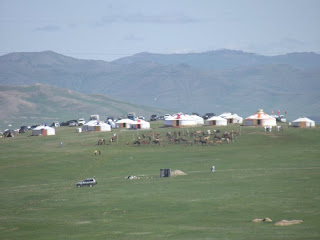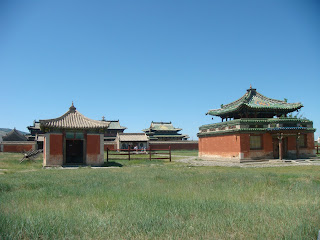I was told how Mongolians celebrate their holidays: extravagant, colorful and loooonnnnggg. And so after spending exactly eleven days of not seeing the cold basement office that housed me for more than five months now, I am back with nothing but a joyous remembrance of my first Mongolian holiday: the Naadam.As early as Thursday before last week, everyone was in no mood to work ( since three of our counterparts were already on leave until August and one will come back on October). Upon saying this, I think it was just rational to have joined their bandwagon and besides cultural adaptation is one of the best perks in international volunteering (wink wink).
Naadam or locally termed as " Eriin gurvan naadam" is a national holiday where Mongolians showcase the "three games of men": wrestling, archery and horse racing.Aside from these competitions, this year marked the 805th year of the establishment of the Great Mongol Empire by Genghis Khan and the 90th anniversary of their independence. But unlike the swarming of tourists and expats to the stadium to witness the elaborate and extravagant opening ceremonies of Naadam here in UB last Monday, I only had a glimpse of it in our living room like a true couch potato. The opening ceremonies was a cultural sight as there were parade of men and women in colorful deels, procession of children riding horses, traditional dances, ensemble of people playing the Morin-khuur and a lot of throat lip synching.
The title of this post said it all, this is an unconventional way to celebrate Naadam since I was not able to see not even a single sport event. But I admit that I was more excited in our half week-long trip to Arvaikheer and Kharkhorin. At the end of the first day of Naadam, two rainbows and a 30 minute firework display graced the skies and the festivities of the whole city.
 |
| Two rainbows highlighted the first day of Naadam |
 |
| The other half of the rainbows |
 |
| A good view of the fireworks display at the 10th floor |
Last Tuesday, along with five of my Filipino friends, we had set out on a spine-numbing ten hour bus trip to Arvaikheer. We were giggly and loud while we tried to tolerate the excruciating length of the trip. It was extra uncomfortable for me since I had a full bladder for 4 hours. One of the things that I should learn though while I am here is how to urinate in the fields or open-pit latrines during trips.
Like my Sainshand trip, the scene on our way to Arvaikheer were constant: steppes, flat lands and herds but more colorful with the help of this fancy drapery.
 |
| Spicing up the view outside were some dainty drapery |
The bus had a couple of stops along the way; one of which was when the whole road was blocked by some policemen for half an hour because of a horse racing event. So here were some of the pictures during the stops( courtesy of Jovy Rabara).
 |
| The horse racing event on our first stop |
 |
| With some locals on their deels during our bus stop |
 |
| Posing in front of our Ovorkhangai bus |
|
|
After ten hours and countless of bus stops, we arrived in Arvaikheer and were all welcomed by the rain. We stayed at Bunny's apartment for two days and roamed around their small town. From July 11- 13, Naadam was declared a national holiday even though most of the provinces have different schedules of Naadam. Like most of the towns here in Mongolia that have massive land area, Arvaikheer has proved that a town with a population of 24,000 in a land area almost as big as the whole province of Zambales can be as deserted as a ghost town especially during holidays.
 |
| With our driver at the Arvaikheer Welcome Sign ( Photo Credits: Jovy Rabara) |
 |
| Arvaikheer Soum Hall |
The day after, the six of us were jammed up in a small car and went to Kharkhorin- Mongolia's ancient capital city. It took us four hours to get there because we needed to snatch a snap of the sceneries and the herds and not to mention getting lost in a short-cut.
 |
| Jammed up with Bunny, a VSO volunteer working in Ovorkhangai |
 |
| A Herd of Camels (Photo Credits by Jovy Rabara) |
|
 |
| My first time to see "Yaks" |
 |
| More herds of sheep and goats |
Mongolians are famous for being "daredevil" drivers. So before we arrived in Kharkhorin, it felt like my stomach, gallbladder, pancreas and intestines were all tied up in a nasty knot. I could even remember the taste of my puke with a tinge of bile on it.
It was already 1 p.m when we reached Kharkhorin. We managed to book the Friday bus tickets back to UB, had some decent lunch in the cheap ger camp we stayed and then drove around the city after our "Beefsteak" lunch.
First Stop: The Phallus Rock ( Rock Penis)
At the site of the Phallus Rock, there were stalls selling antique souvenirs and coins which we initially thought should be in museum but were "good fakes" according to one Israel archaelogist we met on our way home.
Second Stop: Kharkhorin Museum
Not much to say about the museum since we did not go inside- proving Filipino's value of thrift or to be more specific: Filipino volunteers' value of thrift.
Next, we went to the Erdene Zuu Khiid ( Hundred Treasures) which is the first Buddhist monastery in Mongolia that was established in 1586.This monastery was confined by walls and 108 stupas. Before its destruction in 1937 by Stalinism, the monastery housed 60 to 100 temples but now there were only three temples left: Baruun Zuu, Zuu of Buddha and Zuun Zuu which were said to be dedicated to Buddha's three life stages: childhood, adolescence and adulthood. Now, Mongolians are keen in restoring their lost treasures so few restorations were already visible. If you are interested in helping out with the restoration by donating money, I will be happy to inform you how.
Here are some of the pictures I took inside the monastery:
600 meters outside the Erdene Zuu Khiid, a turtle rock awaited us. The Lonely Planet Guide said that there were two turtle rocks in Kharkhorin believed to protect the city, the other one is near the Phallus Rock but we were not able to go there.
So after an hour or so of walking in and out of the monastery, here we were at our final Erdene Zuu Khiid stop:
 |
| Photo Credits: Jovy Rabara |
|
|
Ooops, I almost forgot the birds we saw at the entrance. look how big their claws are, just enough to grind your hand.

After Erdene Zuu, we went back to our ger, bid our goodbyes to our driver, rested for a few hours and wandered around the once glorious city of Kharkhorin.What more could be a best end of our first day in Kharkhorin than a full moon in a starless sky.
The next day we packed our things and met our 10 a.m bus schedule, all fully pumped up to start another week in a foreign land.





























